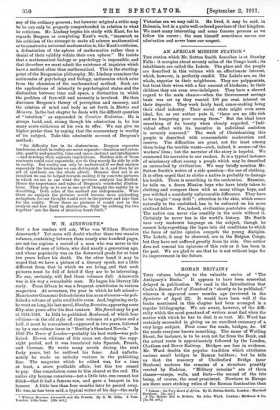AN AFRICAN MISSION STATION.* THE station which Mr. Sutton Smith
describes is at Stanley Falls : it occupies about seventy miles of the Congo bank ; its inhabitants are called the Lokele. The place and the people are described in this volume with an affectionate interest, which, however, is perfectly candid. The Lokele are, on the whole, superior to their neighbours. They are polygamists, but treat their wives with a fair amount of kindness ; to their children they are even over-indulgent: They have a shrewd regard to the main chance—when the Government savings bank was set up they wanted 100 per cent. interest on their deposits. They work fairly hard, canoe-making being their chief industry. Their social state might even seem ideal, for, as our author puts it, "there are no idle rich and no hungering poor among them." But the ideal loses something of its beauty when closely regarded. " Indi- vidual effort with its incentive in individual ambition is severely censured." The work of Christianizing this people is described with commendable moderation and reserve. The difficulties are great, not the least among them being the terrible waste—such, indeed, it seems—of the workers' lives ; but the narrator of the story is hopeful. We commend his narrative to our readers. It is a typical instance of missionary effort among a people which may be described as untouched by civilization. We may briefly mention Mr. Sutton Smith's notice of a side question—the use of clothing. It is often urged that to clothe a native is probably to damage his health. There is something in the contention. Examine, he tells us, a dozen Mission boys who have lately taken to clothing and compare them with as many village boys, and you will find a manifestly unfavourable difference. They have to be taught " soap drill " ; attention to the skin, which comes naturally to the unclothed, has to be enforced on his more civilized fellow. For, indeed, civilization postulates clothing. The native can never rise sensibly in the scale without it. Certainly he never has in the world's history. Mr. Smith uses very moderate language on the subject, though be cannot help regretting the lapse into old conditions to which the force of native opinion compels the young disciples. The Lokele, it may be observed, are in the Belgian Congo, but they have not suffered greatly from its rule. Our author does not conceal his opinions of this rule as it has been in the past. We are glad to see that he is not without hope for its improvement in the future.






































 Previous page
Previous page